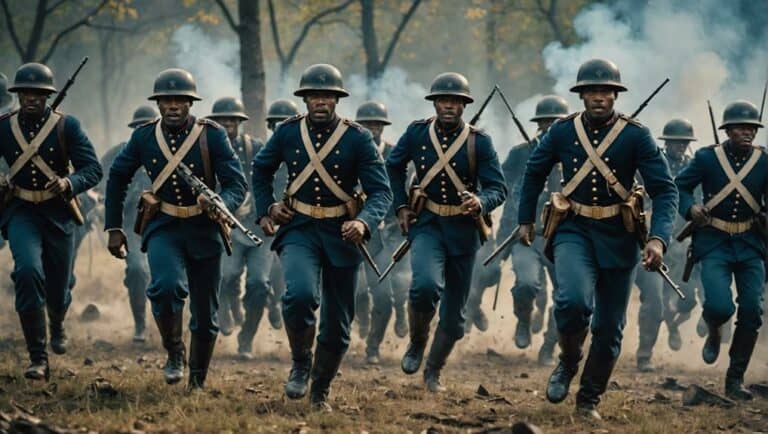The pivotal role of African American soldiers in the Civil War is both inspiring and harrowing, as they overcame immense obstacles to constitute 10% of the Union Army.
Discover the extraordinary bravery of units like the 54th Massachusetts and the profound impact these soldiers had on the war and societal views on race and equality.
Recruitment and Enlistment
The recruitment and enlistment of African American soldiers in the Civil War marked a significant turning point as free black men enthusiastically sought to join the U.S. military, despite initial prohibitions and legal obstacles.
At the war's onset, federal laws barred Negroes from bearing arms. This didn't deter free black men who saw military service as a pathway to freedom and equality. Generals Frémont and Hunter issued proclamations to emancipate slaves and allow their enlistment, but these were quickly revoked.
The pivotal change came with Congress's passage of the Second Confiscation and Militia Act in July 1862. This act not only freed slaves whose masters served in the Confederate Army but also authorized the enlistment of African Americans. It marked a legislative shift, acknowledging the critical role black soldiers could play in the Union's efforts.
In response, the Bureau of Colored Troops was established in May 1863 to manage the increasing numbers of black soldiers. By the end of the war, approximately 179,000 black men, making up 10% of the Union Army, had served.
Their participation was essential, with nearly 40,000 losing their lives, underscoring their significant contribution to the war effort.
Roles and Contributions
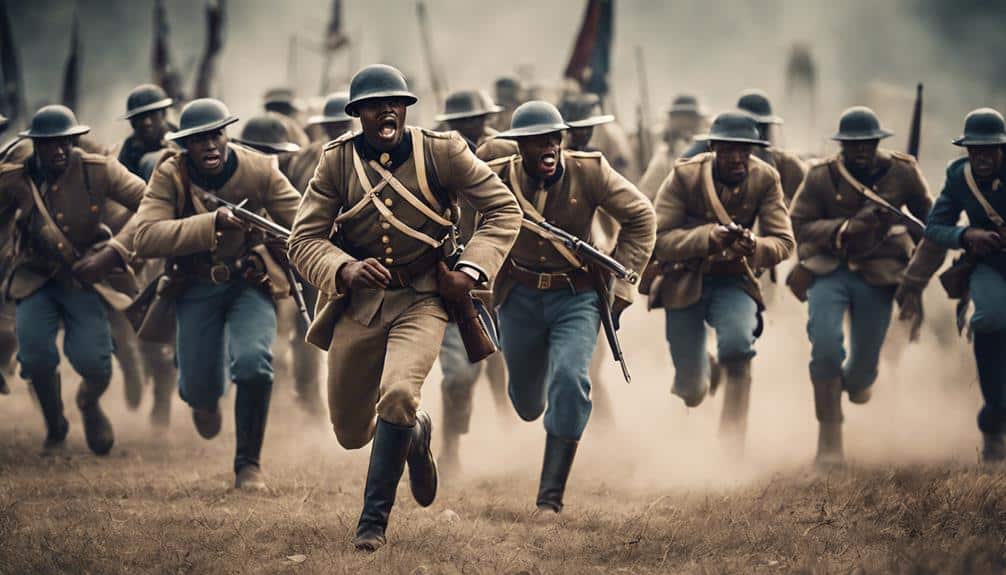
You'll find that African American soldiers in the Civil War played diverse and vital roles, from serving in artillery and infantry units to providing essential noncombat support as carpenters, cooks, and nurses.
Their high casualty rates, with nearly 40,000 deaths primarily from infection or disease, underscore their significant sacrifices.
Remarkably, 16 black soldiers were awarded the Medal of Honor, highlighting their extraordinary valor and bravery in combat.
Diverse Military Roles
Black soldiers in the Civil War played important roles in artillery, infantry, and support positions, greatly contributing to the Union's military efforts. Approximately 179,000 black men, making up about 10% of the Union Army, served in diverse military roles. These roles weren't limited to frontline combat but also included essential support positions like carpenters and nurses, ensuring the army functioned effectively.
In artillery and infantry units, black soldiers demonstrated their bravery and skill, often under extremely harsh conditions. Their presence wasn't just numerical; they provided critical manpower that bolstered the Union's fighting capability. The inclusion of roughly 80 black commissioned officers indicates that leadership roles were also part of their contribution, although still limited by the racial prejudices of the time.
Additionally, black women added to the Union's efforts by serving as nurses, spies, and scouts, showing the wide-ranging impact of African Americans in various facets of the war. By the end of the conflict, 16 black soldiers had received the Medal of Honor, underscoring the valor and dedication they brought to their diverse military roles.
Their contributions were indispensable to the Union's success, reflecting their integral role in reshaping the military landscape.
High Casualty Rates
Despite their significant contributions, African American soldiers faced disproportionately high casualty rates during the Civil War, largely due to harsh treatment and rampant disease. Nearly 40,000 black soldiers died, but a striking 30,000 of these deaths were caused by infection or disease rather than battle wounds. This high mortality rate highlights the severe conditions faced by black soldiers in the Union Army.
You might ask why these soldiers experienced such high casualty rates. The reasons are multifaceted:
- Harsh Treatment: Black soldiers often received inferior medical care compared to their white counterparts.
- Disease: Overcrowded and unsanitary conditions led to widespread illness.
- Combat Roles: They were frequently assigned to high-risk combat roles, increasing their exposure to dangers.
In addition to these factors, African American soldiers served in a variety of capacities, including artillery and infantry, as well as noncombat roles like carpenters and nurses. However, their service was marred by systemic discrimination and neglect, contributing to their high casualty rates.
Understanding these challenges underscores the immense courage and resilience of black soldiers in the Union Army, emphasizing their critical yet often overlooked contributions to the Civil War.
Medal of Honor Recipients
Recognizing the immense courage amidst adversity, 16 African American soldiers were awarded the Medal of Honor during the Civil War, highlighting their extraordinary roles and contributions. These black soldiers served in various capacities, including infantry, artillery, and support positions, demonstrating exceptional valor and dedication. The Medal of Honor, the highest military decoration, was bestowed upon them as a tribute to their heroic deeds on the battlefield.
Black soldiers faced not only the perils of combat but also the harsh realities of racial discrimination and inferior resources. Despite these challenges, their contributions were pivotal in numerous engagements. For instance, Sergeant William Carney, one of the first African American Medal of Honor recipients, displayed remarkable courage at the Battle of Fort Wagner, even after sustaining serious injuries.
The sacrifices made by these soldiers were profound. Nearly 40,000 black soldiers died during the war, with approximately 30,000 succumbing to disease. Their bravery wasn't limited to the battlefield; black women also played vital roles as nurses, spies, and scouts, further underscoring the multifaceted contributions of African Americans.
Understanding the Medal of Honor recipients' roles and sacrifices offers a deeper appreciation of the significant impact black soldiers had during the Civil War.
Challenges Faced
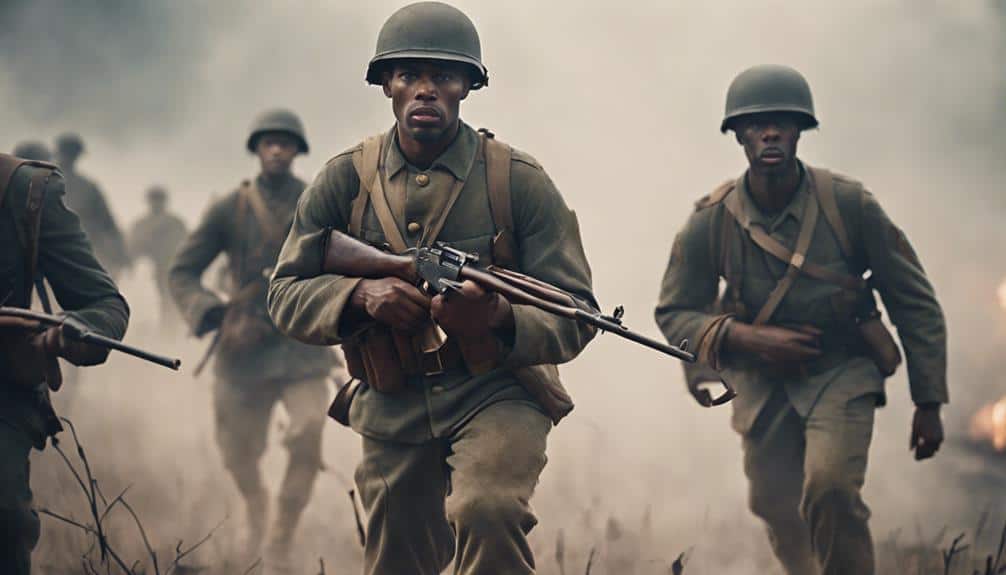
You'll find that African American soldiers faced significant challenges, including pervasive racial prejudice and discriminatory practices within the military.
Segregated units, where black enlisted men were commanded by white officers, highlighted the institutionalized racism in the ranks.
These factors created an environment where black soldiers had to overcome additional hurdles beyond the battlefield.
Racial Prejudice in Military
African American soldiers in the Civil War encountered significant racial prejudice and discriminatory practices that underscored the pervasive inequalities of the era. Despite their willingness to fight for the Union, they faced numerous challenges rooted in systemic racism. One glaring issue was the disparity in pay. Initially, black soldiers received lower pay compared to their white counterparts. Their monthly salaries were further reduced by deductions for clothing allowances, highlighting the racial prejudice and discriminatory practices within the military.
The challenges didn't end with pay discrepancies. Black troops also faced harsher treatment when captured by the Confederate Army, enduring threats of enslavement or execution. To deter such mistreatment, President Lincoln issued General Order 252, emphasizing the dire circumstances African American soldiers faced.
Consider these key points:
- Lower Pay: Black soldiers were paid less than white soldiers and had clothing allowances deducted.
- Harsher Treatment: Black troops captured by Confederates faced severe punishments, including threats of enslavement.
- General Order 252: Issued by President Lincoln to address and deter the mistreatment of black soldiers.
Understanding these challenges paints a clearer picture of the racial prejudices and discriminatory practices that African American soldiers had to overcome during the Civil War.
Segregated Units Commanded Differently
Segregated units in the Civil War, commanded by white officers, reflected the systemic racism and control dynamics that African American soldiers had to navigate. As a black soldier, you'd find yourself in a segregated unit, which was ostensibly designed to maintain order but was deeply rooted in racial prejudice. These units were commanded by white officers who often held discriminatory views, reinforcing a hierarchy that placed black soldiers at a disadvantage.
The pay disparity was immediate and glaring. Black soldiers initially received lower wages than their white counterparts, with deductions for clothing allowances further diminishing their earnings. This financial inequality was just one aspect of the broader discriminatory practices they faced.
Moreover, the risk of capture by the Confederate Army posed severe threats. Black soldiers faced the horrific possibilities of enslavement or execution, a reality that was starkly different from the treatment of white prisoners of war. President Lincoln's General Order 252 aimed to address this, yet it underscored the dangerous and unequal conditions faced by black troops.
In segregated units, the command structure and associated challenges exemplified the broader systemic racism, making the contributions of black soldiers even more remarkable given the adversity they endured.
Treatment of Black POWs
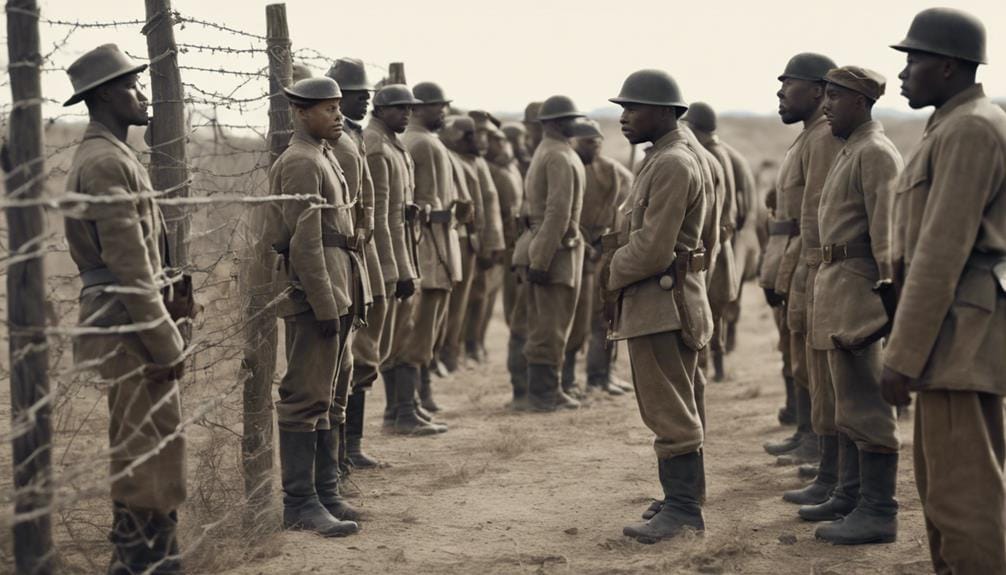
Faced with severe punishment and enslavement by the Confederate Congress, black soldiers captured during the Civil War endured harsher treatment than their white counterparts. The treatment of black POWs was significantly more brutal and discriminatory. When Confederate forces captured black soldiers, they often chose not to treat them as legitimate prisoners of war. Instead, these soldiers faced extreme punishment, systemic mistreatment, and even re-enslavement, violating established wartime protocols.
One of the most harrowing examples of this mistreatment occurred at Fort Pillow in Tennessee. In 1864, Confederate soldiers led a massacre where many black Union soldiers were slaughtered despite their attempts to surrender. General Nathan B. Forrest, who was present, failed to intervene, highlighting the brutal nature of the Confederate stance.
To underscore the severity of the situation:
- Punishment: Captured black soldiers were often subjected to severe corporal punishment.
- Enslavement: Many were re-enslaved or sold into slavery despite being Union soldiers.
- Massacres: Events like Fort Pillow showed the deadly consequences of racial hatred.
President Lincoln's issuance of General Order 252 aimed to deter such breaches of conduct, but the treatment of black POWs remained a tragic and telling aspect of the Civil War.
A White Man's War?
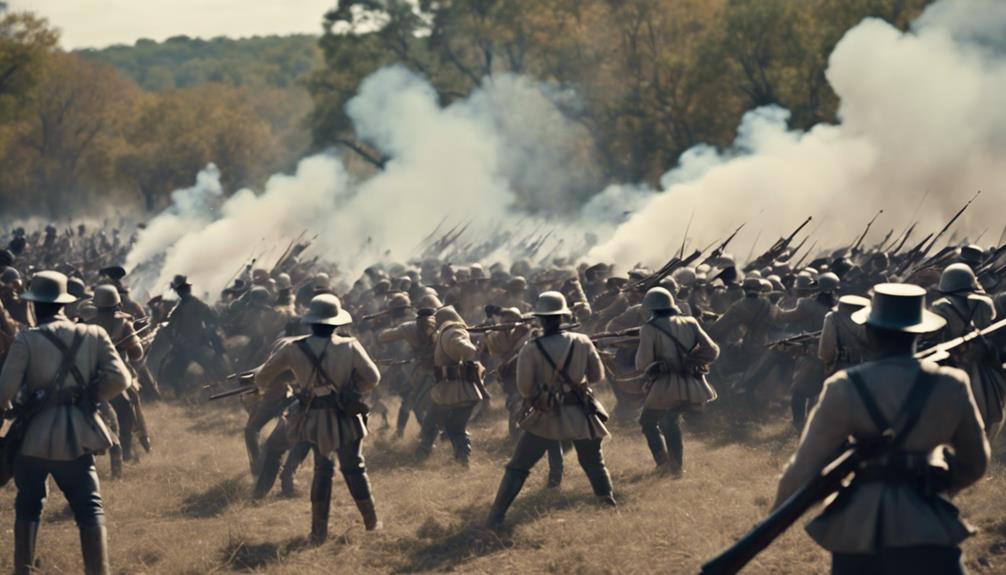
The brutal treatment of black POWs starkly contrasts with the broader question of whether the Civil War was truly a 'white man's war,' highlighting the complexities and evolving dynamics of race and military service during the conflict.
Initially, black soldiers were excluded from state militias since 1792, and the U.S. Army had never accepted them before the Civil War. However, the U.S. Navy allowed African Americans to serve since 1861, with some earning the Congressional Medal of Honor.
President Lincoln feared that arming African Americans might exacerbate secessionist sentiments, causing him to hesitate in enlisting them. It wasn't until the Second Confiscation and Militia Act of 1862 that their employment for rebellion suppression was authorized. The formation of units like the 1st Kansas Colored Infantry and the official mustering of unofficial regiments in January 1863 marked a pivotal shift in U.S. military policy.
Despite these advancements, black soldiers faced significant challenges, including the fight for equal pay for black soldiers compared to their white counterparts. This struggle exemplifies the broader racial tensions and the evolving role of African Americans in the conflict, challenging the notion that the Civil War was solely a 'white man's war'.
The 54th Massachusetts

Formed in response to Governor Andrew's call for Black soldiers, the 54th Massachusetts Infantry Regiment stands as a tribute to the bravery and contributions of African American soldiers during the Civil War. Comprised of soldiers from diverse backgrounds, this regiment was a symbol of the courage and resolve of Black men determined to fight for their freedom and the Union cause.
Under the leadership of Colonel Robert Gould Shaw, the 54th Massachusetts made significant strides in changing perceptions about African American soldiers. Their engagement in the infantry attack at Fort Wagner in 1863 was particularly notable. This battle highlighted not only their bravery but also their willingness to make the ultimate sacrifice. The regiment's actions at Fort Wagner were pivotal for several reasons:
- Recognition: The valor displayed by the 54th Massachusetts led to greater recognition of African American soldiers' capabilities.
- Recruitment: Their bravery inspired more Black men to enlist, bolstering Union forces.
- Equality: The regiment's sacrifices fueled the argument for equal treatment and pay for Black soldiers.
Through their actions, the 54th Massachusetts Infantry Regiment underscored the significant impact African American soldiers had during the Civil War, challenging prejudices and paving the way for future generations.
Confederate Threats
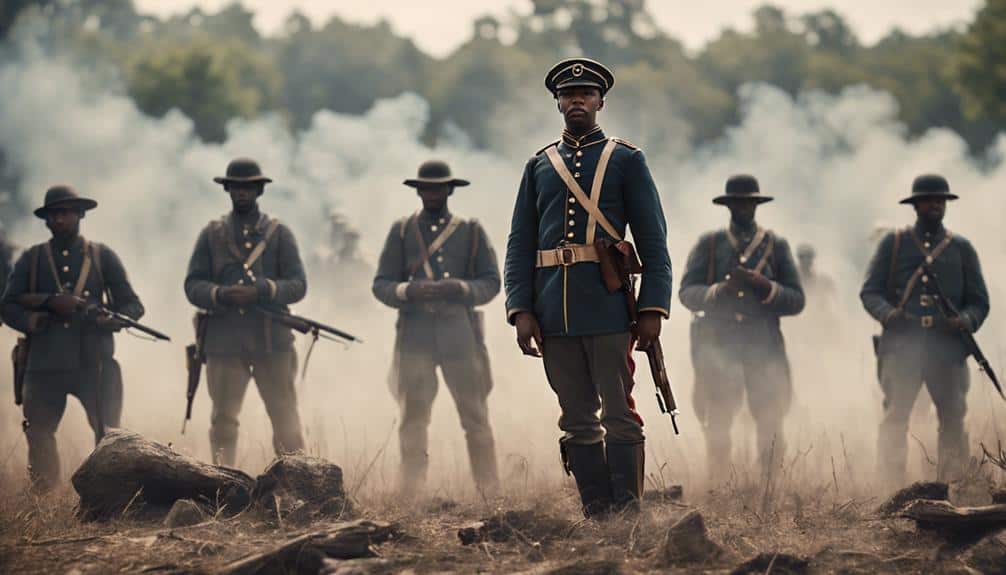
Confederate threats against African American soldiers during the Civil War were severe and included the possibility of execution or re-enslavement, highlighting the extreme risks these soldiers faced. Confederate Congress threatened severe punishment for Black soldiers, treating captured soldiers more harshly than their white counterparts. This harsh treatment was a clear strategy to intimidate and discourage African American enlistment in the Union forces.
For Black soldiers, the risk of being captured by Confederate forces was particularly dire. Confederate threats often resulted in Black captives being executed or re-enslaved, a fate that White prisoners didn't typically face. As a result, the Union issued reprisal threats to guarantee better treatment, but this wasn't always effective. The Confederates' brutal policies forced the Union to strategically keep Black soldiers away from the front lines, minimizing their exposure to this danger.
However, despite these Confederate threats, the resolve of Black soldiers remained strong. They continued to fight valiantly, knowing the immense risks involved. This determination not only showcased their bravery but also underscored the harsh realities and injustices they faced during the Civil War. Understanding these threats provides a clearer picture of the perilous conditions under which these soldiers served.
The Fight for Equal Pay
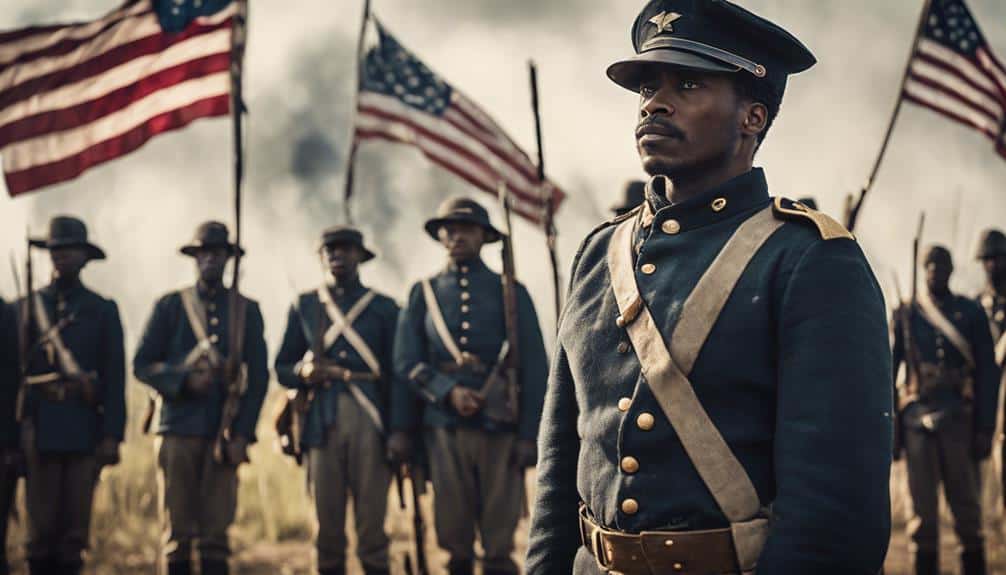
Black soldiers in the Civil War faced a significant struggle for equal pay, reflecting broader issues of racial inequality within the U.S. Army. Initially, Black soldiers were paid less than their white counterparts, which underscored the pervasive racial discrimination of the time. This disparity didn't just affect morale; it highlighted the ongoing fight for equality that African American soldiers were engaged in, even as they fought for the Union.
President Lincoln's administration eventually recognized this injustice. In 1864, Congress authorized equal pay for Black and white soldiers, a significant step toward rectifying the wrongs. By the end of the Civil War in 1865, around 180,000 Black men had served in the U.S. Army, many of whom had been formerly enslaved individuals from Confederate states.
Consider the following key points:
- Initial Pay Disparity: Black soldiers initially earned less than white soldiers.
- Legislative Action: Congress authorized equal pay in 1864.
- Service and Sacrifice: 40,000 Black soldiers died, including 10,000 in battle.
This fight for equal pay was more than just a financial issue—it was a battle for dignity and recognition of Black soldiers' equal contributions and sacrifices in the Civil War.


